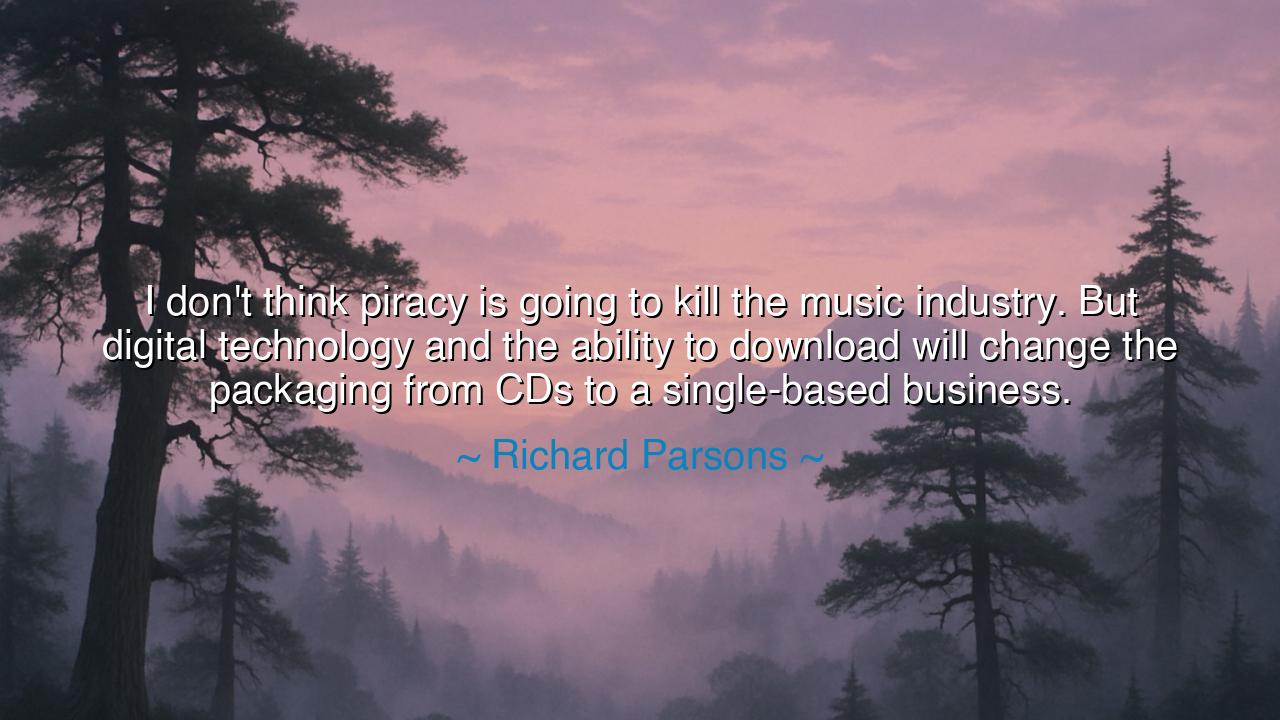
I don't think piracy is going to kill the music industry. But
I don't think piracy is going to kill the music industry. But digital technology and the ability to download will change the packaging from CDs to a single-based business.






In the words of Richard Parsons, a steward of industry who witnessed the great turning of the digital age, there is a declaration that cuts through fear and reveals clarity: “I don’t think piracy is going to kill the music industry. But digital technology and the ability to download will change the packaging from CDs to a single-based business.” These words, though anchored in the transformation of music, are in truth a reflection of the eternal cycle of change, where form falls away but essence endures.
For many trembled at the rise of piracy, fearing that the theft of songs across the seas of the internet would destroy the livelihood of musicians, dismantle the temples of sound, and leave the world silent. But Parsons, with a vision unclouded by panic, saw differently. He recognized that the heart of the music industry was not in the vessels that carried the songs—be they records, tapes, or discs—but in the songs themselves, in the art, in the soul that pours itself into melody and word. Piracy could wound, but it could not kill. What would transform the industry was the march of digital technology itself.
His insight rests upon a shift in packaging. Once, entire albums were bound in CDs, crafted and sold as whole creations. But the rise of downloading scattered the bundle, allowing listeners to pluck songs one by one, like ripe fruit from a tree. This was not destruction, but metamorphosis. The album, once a monolith, gave way to the single, where each song must stand on its own strength. Thus Parsons foresaw the age in which artists would live not by collections, but by the fire of individual offerings, each note carrying the weight of survival.
History offers parallels to this shift. Consider the invention of the printing press. Before its rise, knowledge was bound in manuscripts, precious and whole, copied with labor and guarded in monasteries. But the press scattered words into countless pages, cheap and accessible. The form of knowledge changed, but knowledge itself did not die—it expanded. So too with music: the CD faded, but the song lived on, carried more swiftly, more widely, to the ears of the world. What seemed like the end was, in truth, a rebirth.
Parsons’ words also strike at the heart of human resistance to change. Too often, when forms dissolve, people cry out that the essence will vanish. Yet history shows otherwise. The scroll gave way to the codex; the stage play gave way to the cinema; the radio gave way to television—and in each case, the spirit did not perish, but transformed. His wisdom reminds us: the song is not the CD, nor the book the parchment, nor the soul the body. The vessel shifts, but the essence endures.
The meaning of the quote is thus: do not confuse the form with the life it carries. Digital technology does not spell the death of music; it is merely the next riverbed through which the current flows. The download is not an enemy but a herald of new ways of creation, distribution, and connection between artist and audience. Fear of piracy distracted many, but the true power lay in understanding the deeper transformation—how music would be consumed, valued, and shared in a new world.
The lesson for us is clear: do not cling to forms that are passing, but seek the essence that endures. Whether in art, in business, or in life, the outer shell will always change, and new vessels will always appear. Instead of lamenting the death of the old, prepare yourself to embrace the new, carrying forward what truly matters. Let the artist focus not on the CD, but on the song; let the thinker focus not on the page, but on the idea; let the soul focus not on the body, but on the spirit.
So let Richard Parsons’ words be remembered as both prophecy and counsel: fear not the waves of technology, for they do not drown the essence—they only change the boat upon which it sails. Learn to recognize the difference between vessel and substance, between form and soul. For those who see this distinction will not mourn the past, but will shape the future, and in shaping it, will ensure that the song—ancient and eternal—continues to be heard.






AAdministratorAdministrator
Welcome, honored guests. Please leave a comment, we will respond soon